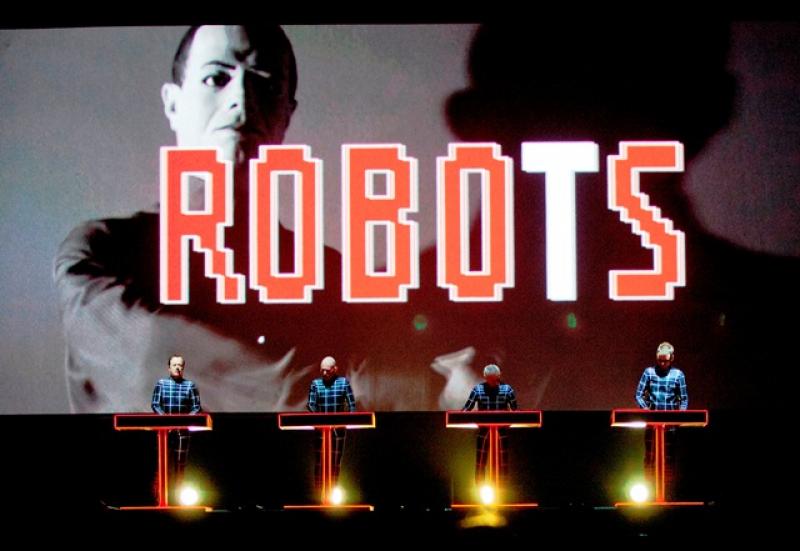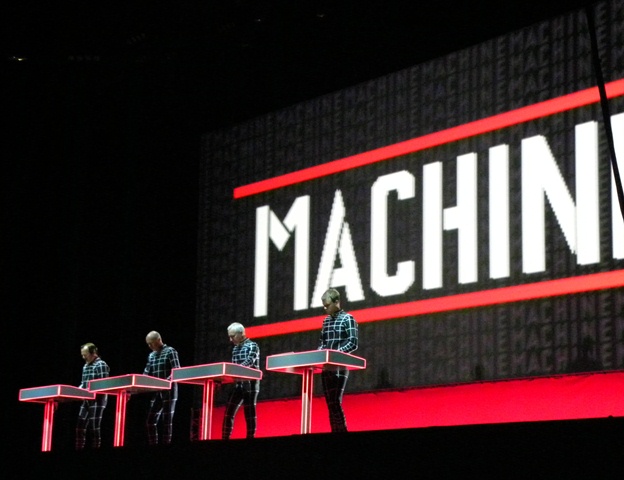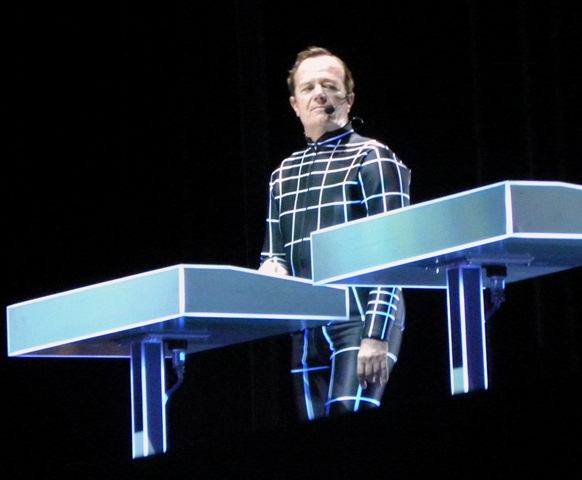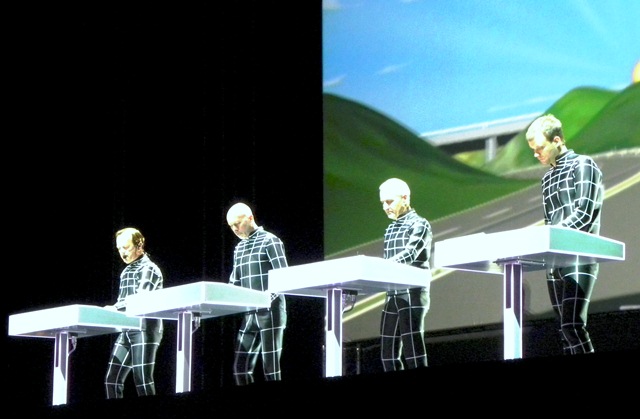Kraftwerk: The Man Machine, Tate Modern | reviews, news & interviews
Kraftwerk: The Man Machine, Tate Modern
Kraftwerk: The Man Machine, Tate Modern
A performance of robotic brilliance, but when will Kraftwerk deliver some new music?

A giant arm sweeps across the rapt audience. The newly anointed onlookers all wear the same, white-framed, glasses. A chant is heard:“We are the robots.” Those congregating in the over-sized shoebox of Tate Modern’s Turbine Hall could be at a cult meeting. In gathering to pay respect, the audience share more than a passion for Kraftwerk. They also all wear the same 3D glasses.
Introducing The Man Machine before its release to the press at Paris’s Tour Montparnasse, Kraftwerk themselves appeared for a scant five minutes, pissing off the assembled hacks. Promotion was left to a quartet of just-unveiled Kraftwerk dummies – the robots now integral to the band’s iconography. It began a process of sublimation and evasion that has culminated with the current, live model of Kraftwerk.
 Kraftwerk didn’t tour on the back of The Man Machine’s release, possibly due to being stung by criticism of their new image (too militaristic for the French and too Communist for America, where their label initially rejected the sleeve). Last night was a belated catch-up of sorts, in the appropriate setting of Tate Modern, no doubt deliberately chosen as it used to be a power plant.
Kraftwerk didn’t tour on the back of The Man Machine’s release, possibly due to being stung by criticism of their new image (too militaristic for the French and too Communist for America, where their label initially rejected the sleeve). Last night was a belated catch-up of sorts, in the appropriate setting of Tate Modern, no doubt deliberately chosen as it used to be a power plant.
The Man Machine took up the first 34 of last night’s 115 minutes. Reprised in order, there was little to distinguish it sonically from the vinyl original. Ralf Hütter’s in-person vocals were drier and more clipped. Heard live, with extraordinary fidelity, “Neon Lights” was more beautiful, more romantic than ever. With the Kraftwerk four largely static in a row – though Hütter did shake a leg to “The Model” – the necessary added dimension came from the gripping 3D graphics. During “Spacelab”, the subject of the song jabbed its antenna into your eyes.
After the album, it was straight into the Greatest Hits home stretch. Largely in chronological order, it strolled through “Autobahn”, "Radioactivity”, “Trans Europe Express”, "Computer World" and beyond. No “Pocket Calculator”. By taking the linear path, later, rhythm-based pieces like “AeroDynamik” came across as less textured, less multi-dimensional than their predecessors.
For a seminal and innovatory unit, the content of the accompanying films were lessons in how Kraftwerk always struck a balance with the past. The logo of German film studio UFA flew around the turbine hall. The cars whizzing along the autobahn were vintage Volkswagens, Mercedes, Fiats and Citroëns. The models seen in black and white wore New Look-era gowns.
 Krafwerk’s relationship to their own past was also central to last night. When The Man Machine, their seventh album, was released, Kraftwerk were Hütter, Florian Schneider, Wolfgang Flur and Karl Bartos. Hütter (pictured left) and Schneider were the founders. Now, only Hütter remains. He’s accompanied on stage by the band's long-time live sound engineer Henning Schmitz, studio sound engineer/programmer Fritz Hilpert and Falk Grieffenhagen, responsible for the live visuals. The music is subservient to how the technology serves it up.
Krafwerk’s relationship to their own past was also central to last night. When The Man Machine, their seventh album, was released, Kraftwerk were Hütter, Florian Schneider, Wolfgang Flur and Karl Bartos. Hütter (pictured left) and Schneider were the founders. Now, only Hütter remains. He’s accompanied on stage by the band's long-time live sound engineer Henning Schmitz, studio sound engineer/programmer Fritz Hilpert and Falk Grieffenhagen, responsible for the live visuals. The music is subservient to how the technology serves it up.
Which is ironic, as The Man Machine had its genesis in that most organic and rockist of creative methods – jamming. The songs grew from studio improvisations which Hütter cherry picked and edited.
Today’s fully digital Kraftwerk is rendered all the more poignant as their first encounter with digital technology at New York’s Power Station Studios to mix the proposed Technopop album found them flummoxed and out of step with new developments. After years leading the way, they returned from there to Düsseldorf to digitally upgrade their Kling Klang studio and rework the songs. They never really recovered momentum. New releases slowed to a trickle and then stopped. Remixes and revisits became the default.
 More curious is the foreshortening of their own history. Last night was billed as part of Kraftwerk – The Catalogue 1 2 3 4 5 6 7 8, a season previously seen in New York and Düsseldorf built around their eight albums from 1974’s Autobahn to 2003’s Tour de France. This octet was collected for the 2009 box set, The Catalogue. Yet their first three albums were absent from there and these outings. Minus-one, minus-two and minus-three perhaps? The album they made under the name Organisation in 1970 is presumably self-edited into extinction.
More curious is the foreshortening of their own history. Last night was billed as part of Kraftwerk – The Catalogue 1 2 3 4 5 6 7 8, a season previously seen in New York and Düsseldorf built around their eight albums from 1974’s Autobahn to 2003’s Tour de France. This octet was collected for the 2009 box set, The Catalogue. Yet their first three albums were absent from there and these outings. Minus-one, minus-two and minus-three perhaps? The album they made under the name Organisation in 1970 is presumably self-edited into extinction.
None of this is a lament for what’s lost or what’s changed, or for who or what Kraftwerk are. All of this made last night what it was. This encounter with the largely non-corporeal - not a concert, not a show or gig - was a mind-blowing, quasi-mystical experience. It underlined the magnificence and importance of Kraftwerk, something which hardly needs saying. It was an event. Homage was paid. As far as the staging goes, creativity still lives and breathes. But without some new music, in spite of this quite brilliant spectacle, today’s Kraftwerk is an elongated full stop.
Watch Kraftwerk perform The Man Machine's "The Robots" and "Radioactivity" on French TV in 1978
rating
Share this article
The future of Arts Journalism
You can stop theartsdesk.com closing!
We urgently need financing to survive. Our fundraising drive has thus far raised £49,000 but we need to reach £100,000 or we will be forced to close. Please contribute here: https://gofund.me/c3f6033d
And if you can forward this information to anyone who might assist, we’d be grateful.

Subscribe to theartsdesk.com
Thank you for continuing to read our work on theartsdesk.com. For unlimited access to every article in its entirety, including our archive of more than 15,000 pieces, we're asking for £5 per month or £40 per year. We feel it's a very good deal, and hope you do too.
To take a subscription now simply click here.
And if you're looking for that extra gift for a friend or family member, why not treat them to a theartsdesk.com gift subscription?
more New music
 Album: Robert Plant - Saving Grace
Mellow delight from former Zep lead
Album: Robert Plant - Saving Grace
Mellow delight from former Zep lead
 Brìghde Chaimbeul, Round Chapel review - enchantment in East London
Inscrutable purveyor of experimental Celtic music summons creepiness and intensity
Brìghde Chaimbeul, Round Chapel review - enchantment in East London
Inscrutable purveyor of experimental Celtic music summons creepiness and intensity
 Album: NewDad - Altar
The hard-gigging trio yearns for old Ireland – and blasts music biz exploitation
Album: NewDad - Altar
The hard-gigging trio yearns for old Ireland – and blasts music biz exploitation
 First Person: Musician ALA.NI on how thoughts of empire and reparation influenced a song
She usually sings about affairs of the heart - 'TIEF' is different, explains the star
First Person: Musician ALA.NI on how thoughts of empire and reparation influenced a song
She usually sings about affairs of the heart - 'TIEF' is different, explains the star
 Album: The Divine Comedy - Rainy Sunday Afternoon
Neil Hannon takes stock, and the result will certainly keep his existing crowd happy
Album: The Divine Comedy - Rainy Sunday Afternoon
Neil Hannon takes stock, and the result will certainly keep his existing crowd happy
 Music Reissues Weekly: Robyn - Robyn 20th-Anniversary Edition
Landmark Swedish pop album hits shops one more time
Music Reissues Weekly: Robyn - Robyn 20th-Anniversary Edition
Landmark Swedish pop album hits shops one more time
 Album: Twenty One Pilots - Breach
Ohio mainstream superstar duo wrap up their 10 year narrative
Album: Twenty One Pilots - Breach
Ohio mainstream superstar duo wrap up their 10 year narrative
 Album: Ed Sheeran - Play
A mound of ear displeasure to add to the global superstar's already gigantic stockpile
Album: Ed Sheeran - Play
A mound of ear displeasure to add to the global superstar's already gigantic stockpile
 Album: Motion City Soundtrack - The Same Old Wasted Wonderful World
A solid return for the emo veterans
Album: Motion City Soundtrack - The Same Old Wasted Wonderful World
A solid return for the emo veterans
 Album: Baxter Dury - Allbarone
The don diversifies into disco
Album: Baxter Dury - Allbarone
The don diversifies into disco
 Album: Yasmine Hamdan - I Remember I Forget بنسى وبتذكر
Paris-based Lebanese electronica stylist reacts to current-day world affairs
Album: Yasmine Hamdan - I Remember I Forget بنسى وبتذكر
Paris-based Lebanese electronica stylist reacts to current-day world affairs
 theartsdesk on Vinyl 92: Marianne Faithful, Crayola Lectern, UK Subs, Black Lips, Stax, Dennis Bovell and more
The biggest, best record reviews in the known universe
theartsdesk on Vinyl 92: Marianne Faithful, Crayola Lectern, UK Subs, Black Lips, Stax, Dennis Bovell and more
The biggest, best record reviews in the known universe

Add comment